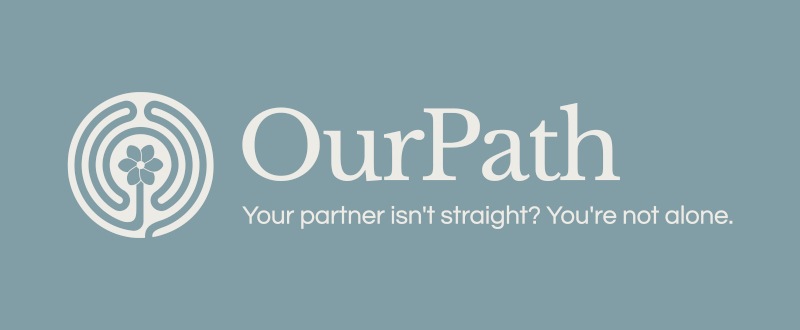OurPath Open Forum
This forum is for discussion of issues related to Mixed Orientation relationships only, that is when one partner is heterosexual (straight) and one is Lesbian, Gay, Bisexual, Transgender or Questioning.
If this does not apply to your topic, please find another forum.
* Opinions posted here, including that of the Administrator, are the poster's own and do not necessarily reflect the views or policies of OurPath.
* As a peer-to-peer network, any advice given is that of a peer, based on personal experience, and should not be considered professional in nature.
* Any discussion of LGBT related issues is acceptable provided it remains constructive and respectful of other viewpoints. Hateful, degrading, or prejudiced speech and/or personal attacks will not be tolerated.
NOTE: Due to recurring spam abuse, you must register to post.
- De_Profundis
- Member
 Offline
Offline
Re: Crowdsourcing content for a new SSN article
I appreciate the generous thinking behind this planned article, but I am also very doubtful that it would help future spouses/partners going through this situation, at least not when you're talking about spouses of people coming out as transgender. (I have no personal experience with the spouse coming out as gay/lesbian, so I can't speak to that.) The trans person is usually guarded by a "narcissistic bubble" (of their own forming, I believe) which protects them from hearing anything that threatens the new identity and new life that they're creating.
Or to put it a different way -- they know what they should be doing and how they should be treating their spouse, but they simply don't care.
- Tamiam
- Member
 Offline
Offline
Re: Crowdsourcing content for a new SSN article
Hi Phoenix,
Great idea for an article!
If I had to pick one thing that truly would have made healing easier, it is honesty. I mean honesty across the board. My ex has told different things to different people. He gasped out an apology before actually fading in and out of consciousness, during the conversation where I confronted him in private. Everything else out of his mouth has been about how awful I was. To our children, to his co-workers, to friends and family. There has been no acknowledgment of any pain caused. Only blame.
His behavior is such that we have had to set up some major boundaries. The older 3 kids don't see him at all. The younger two still have to by court order, but desperately do not want to. We could have worked through the pain, the change. We had a LOT of family counseling. But it was more important for him to be "blameless" than honest.
In writing this, I guess I'm saying two things: Honesty and Acknowledgment.
My advice to a spouse needing to come out:
1. Don't pretend to be straight in the first place.
2. If you did, acknowledge that it was wrong of you to do so. There is no reason that makes this ok.
3. Be honest in all things. It's where forgiveness might start.
4. Acknowledge that your spouse is going to weather this in a very different way than you, and that does not equal unsupportive.
5. You are not, at your core, the person your spouse married.
Phoenix, I cannot imagine a GID spouse following these suggestions either, but it's worth putting out there! I also acknowledge that these are very simple statements for a very complex problem. My children and I have been through so much, I wouldn't wish this on anyone. I can't believe that we could cover in an article the sick variety of harm that has been done to straight spouses and their families.
- Julian_Stone
- Member
 Offline
Offline 
Re: Crowdsourcing content for a new SSN article
I think this is a great idea, Phoenix. The news will never be less shocking or easier to bear, but the delivery can certainly be more delicate. Many of our spouses seem to take the kick-them-while-they're-down approach to "coming out".
My advice to the non-straight spouse:
1. Don’t come out on a significant day (birthday, holiday, anniversary, etc.)
2. Do not use your coming out as a time to talk about your general unhappiness in the marriage. Your spouse is likely (irrationally) blaming him/herself for your same-sex attraction.
3. Do not shift the blame onto your spouse: “If I felt respected…” “If I felt that you really loved me…” (etc.) this gay/bisexual thing would never even have come up…” as if your spouse somehow triggered “the gay button.”
4. Take accountability for the dishonesty, deception, and betrayal.
5. Show empathy toward your spouse.
6. Do not force your spouse into the dark, miserable closet. He/she will desperately need to talk to someone outside of the marriage (a friend, relative, etc.)
7. Do not come out to others (non-professionals) before your spouse. This one was particularly hurtful to me….the fact that someone out there (3 people, actually) knew my whole world was about to be turned upside down while I was completely in the dark.
8. Do the kind/loving thing and leave. Do not give your spouse false hope or stay in the marriage to protect your closet. Do not force your spouse (who is likely desperate to keep the family intact) to make the incredibly difficult decision to end the marriage.
- walkbymyself
- Member
 Offline
Offline
Re: Crowdsourcing content for a new SSN article
Julian: excellent post. I would emphasize this: asking your spouse or children to keep your orientation secret, is abuse. It isolates us from our support network, and forces us to put up a false cheer when we really need to mourn. There are times it’s just easier to avoid human contact entirely, because the false front is more than we can handle.
My husband has not yet told his family about our divorce, and in practical terms this means my daughter is avoiding her cousins and her aunt and uncles.
Relinquere fraudator, vitam lucrari.

